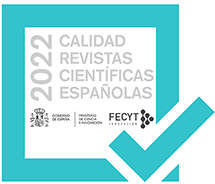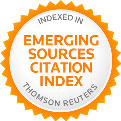Frecuencia de práctica y motivos de participación/no participación en actividades físicas en función del género de escolares de 10-12 años de Melilla. (Practice frecuency and reasons for paticipation/no participation in physical activities of 10-12 years years old schoolchildren from Melilla).
Resumen
El presente artículo expone los resultados de un estudio dirigido a conocer la influencia del género en la frecuencia semanal y diaria de práctica de actividad física, así como en los motivos/no motivos de práctica de actividad física que manifiestan escolares de 10-12 años de Melilla. Los participantes han sido todos los escolares de los cursos 5º y 6º (10 - 12 años) de tres colegios públicos de Melilla (n= 439). Los datos se han recogido a través del cuestionario de “Hábitos de participación en Actividades Físicas”. Los resultados muestran la existencia de diferencias significativas en función del género en la frecuencia diaria de práctica (z= 2,72, p < ,01), y que los motivos principales para la participación en actividades físicas son aquellos relacionados con la salud “me gusta estar saludable”, “es bueno hacer ejercicio”, “para mantener la línea”, mientras que los relacionados con los aspectos sociales “me gusta divertirme y ocupar mi tiempo de ocio” y “encontrarme con los amigos”. Los motivos que les llevan a no participar en programas de actividad física son “falta de tiempo” y “estudios, hacer deberes”, resultados similares a los hallados en estudios anteriores en otros contextos nacionales e internacionales.
Palabras claves: actividad física; educación primaria; motivos de práctica; frecuencia de práctica; géneroAbstract
The present article presents the results of a study aimed at know the influence of gender in weekly and daily practice and in the reasons/non-reasons for practicing physical activity that show school age 10-12 years of Melilla. The participants were all schoolchildren in courses 5 and 6th (10-12 years) from three public schools in Melilla (n= 439). Data were collected through the “Habits of Participation in Physical Activities Questionnaire”. The results show the significant differences gender in the daily frequency of practice (z= 2,72, p < ,01). the main reasons for participating in physical activities in free time are those more closely related to the health field (i.e. “I like being healthy and fit”, “Taking exercise is good”, “I want to keep my figure and look fine”), as well as to the social aspects of participating in this kind of activities (i.e. “I like having fun and filling my leisure time” or “I like to meet friends and do things with them”). Moreover, the reasons for not participating in physical activity programs stand out very significantly from the rest: “lack of time” or “studies, doing homework, other academic activities”. These results are similar to the findings of previous studies developed in different national and international contexts.
Key words: physical activity; primary education; reasons for practice; practice frequency; gender.
doi:10.5232/ricyde2010.02103
---------------------------------------------------------------------
Referencias/references
Lasheras, L.; Aznar, S.; Merino, B., & López, E. G. (2001). Factors associated with physical activity among Spanish youth through the National Health Survey. Preventive Medicine, 32, 455-464.
doi:10.1006/pmed.2001.0843
PMid:11394949
Sallis, J.; Prochaska, J., & Tailor, W. (2000). A review of correlates of physical activity of children and adolescents. Medicine & Science in Sports & Exercise, 32(5), 963-975.
doi:10.1097/00005768-200005000-00014
Steptoe, A,; Wardle, J,; Cui, W.; Bellisle, F.; Zotti, A. M. & Baranyai, R. (2002). Trends in smoking, diet, physical exercise, and attitudes toward health in European University students from 13 countries, 1990-2000. Prev Med., 35, 97-104
doi:10.1006/pmed.2002.1048
PMid:12200093
Trost, S. G.; Pate, R. R.; Sallis, J. F.; Freedson, P. S.; Taylor, W. C.; Dowda, M., & Sirard, J. (2002). Age and gender differences in objectively measured physical activity in youth. Medicine and Science in Sports and Exercise, 34, 350-355.
doi:10.1097/00005768-200202000-00025
PMid:11828247
---------------------------------------------------------------------
Palabras clave/key words
Texto completo/Full Text:
PDF------------------------ 0 -------------------------
RICYDE. Revista Internacional de Ciencias del Deporte
![]()

Publisher: Ramón Cantó Alcaraz
ISSN:1885-3137 - Periodicidad Trimestral / Quarterly

